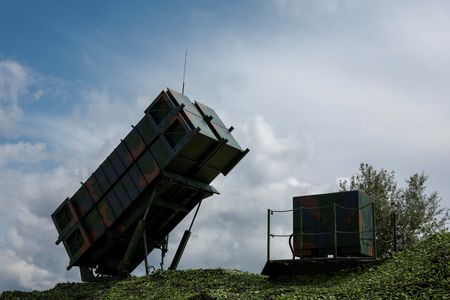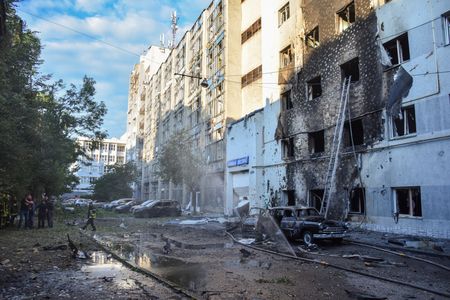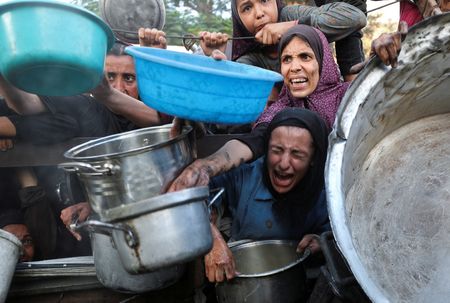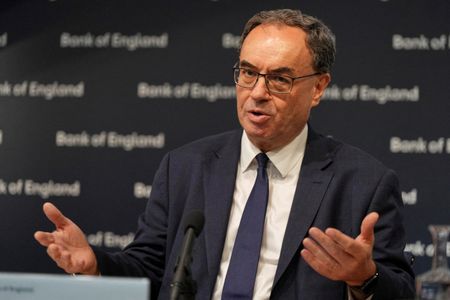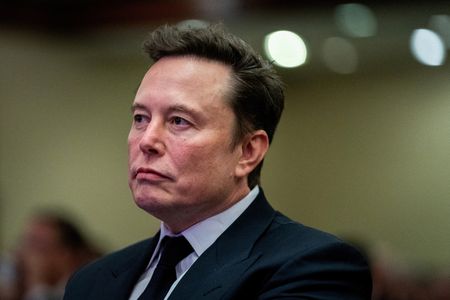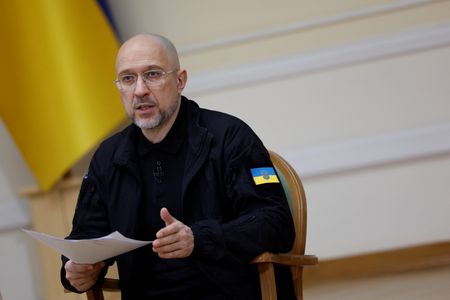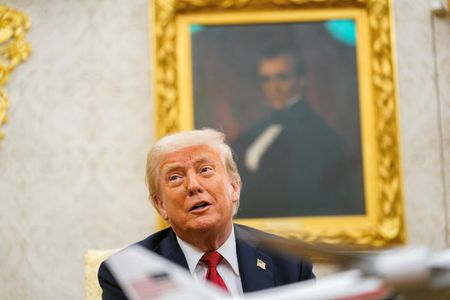By Anastasiia Malenko, Steve Holland and Dan Peleschuk
KYIV/WASHINGTON (Reuters) -U.S. President Donald Trump announced new weapons for Ukraine on Monday, and threatened sanctions on buyers of Russian exports unless Russia agrees a peace deal, a major policy shift brought on by frustration with Moscow’s ongoing attacks on its neighbor.
But Trump’s threat of sanctions came with a 50-day grace period, a move that was welcomed by investors in Russia where the rouble recovered from earlier losses and stock markets rose.
Sitting with NATO Secretary General Mark Rutte in the Oval Office, Trump told reporters he was disappointed in Russian President Vladimir Putin and that billions of dollars of U.S. weapons would go to Ukraine.
“We’re going to make top-of-the-line weapons, and they’ll be sent to NATO,” Trump said, adding that Washington’s NATO allies would pay for them.
The weapons would include Patriot air defence missiles Ukraine has urgently sought.
“It’s a full complement with the batteries,” Trump said. “We’re going to have some come very soon, within days… a couple of the countries that have Patriots are going to swap over and will replace the Patriots with the ones they have.”
Some or all of 17 Patriot batteries ordered by other countries could be sent to Ukraine “very quickly”, he said.
Rutte said Germany, Finland, Denmark, Sweden, Norway, the United Kingdom, the Netherlands and Canada all wanted to be a part of rearming Ukraine.
Trump’s threat to impose so-called secondary sanctions on Russia, if carried out, would be a major shift in Western sanctions policy. Lawmakers from both U.S. political parties are pushing for a bill that would authorise such measures, targeting other countries that buy Russian oil.
Throughout the more than three-year-old war, Western countries have cut most of their own financial ties to Moscow, but have held back from taking steps that would restrict Russia from selling its oil elsewhere. That has allowed Moscow to continue earning hundreds of billions of dollars from shipping oil to buyers such as China and India.
“We’re going to be doing secondary tariffs,” Trump said. “If we don’t have a deal in 50 days, it’s very simple, and they’ll be at 100%.”
A White House official said Trump was referring to 100% tariffs on Russian goods as well as secondary sanctions on other countries that buy its exports. Eighty-five of the 100 U.S. senators are co-sponsoring a bill that would give Trump the authority to impose 500% tariffs on any country that helps Russia, but the chamber’s Republican leaders have been waiting for Trump to give them the go-ahead for a vote.
In Kyiv, people welcomed the announcement but some remained cautious about Trump’s intentions.
“I am pleased that finally European politicians, with their patience and convictions, have slightly swayed him (Trump) to our side, because from the very beginning it was clear that he did not really want to help us,” said Denys Podilchuk, a 39-year-old dentist in Kyiv.
GRACE PERIOD
Artyom Nikolayev, an analyst from financial information firm Invest Era, said Trump did not go as far as Russian markets had feared.
“Trump performed below market expectations. He gave 50 days during which the Russian leadership can come up with something and extend the negotiation track. Moreover, Trump likes to postpone and extend such deadlines,” he said.
Asked about Trump’s remarks, U.N. Secretary-General Antonio Guterres said an immediate ceasefire was needed to pave the way for a political solution and “whatever can contribute to these objectives will, of course, be important if it is done in line with international law.”
Since returning to the White House promising a quick end to the war, Trump has sought rapprochement with Moscow, speaking several times with Putin. His administration has pulled back from pro-Ukrainian policies such as backing Kyiv’s membership in NATO and demanding Russia withdraw from all Ukrainian territory.
But Putin has yet to accept a proposal from Trump for an unconditional ceasefire, which was quickly endorsed by Kyiv. Recent days have seen Russia use hundreds of drones to attack Ukrainian cities.
Trump said his shift was motivated by frustration with Putin, who talked about peace but continued to strike Ukrainian cities. “I don’t want to say he’s an assassin, but he’s a tough guy,” he said.
“We actually had probably four times a deal. And then the deal wouldn’t happen because bombs would be thrown out that night and you’d say we’re not making any deals,” he said.
Last week he said, “We get a lot of bullshit thrown at us by Putin.”
U.S. Senator Jeanne Shaheen, the top Democrat on the Senate Foreign Relations Committee, said Trump’s announcement was “positive, but overdue” and he needed to commit “to a sustained flow of security assistance to Ukraine over the long term” if he wanted Putin to negotiate and the war to end.
Ukrainian President Volodymyr Zelenskiy held talks with Trump’s envoy Keith Kellogg on Monday.
Zelenskiy said they discussed “the path to peace and what we can practically do together to bring it closer”, including “strengthening Ukraine’s air defence, joint production and procurement of defence weapons in collaboration with Europe.”
An air-raid alert was declared in Kyiv shortly after Zelenskiy’s talks with Kellogg.
Separately on Monday, Zelenskiy said he would replace his long-serving Prime Minister Denys Shmyhal with Shmyhal’s first deputy, Yulia Svyrydenko, an economist who played a key role in negotiations between Kyiv and Washington on a minerals deal. Her appointment will require parliamentary approval.
Russia began its full-scale invasion in February 2022 and holds about one-fifth of Ukraine. Its forces are slowly advancing in eastern Ukraine and Moscow shows no sign of abandoning its main war goals.
(Additional reporting by Frank Jack Daniel, Sergiy Karazy and Vladyslav Smilianets in Kyiv, Kevin Lamarque and Patricia Zengerle in Washington, Sabine Siebold in Berlin, Lidia Kelly in Warsaw and Michelle Nichols at the United Nations, Writing by Timothy Heritage, Peter Graff and David Brunnstrom; Editing by Gareth Jones, Andrew Heavens, Don Durfee and Cynthia Osterman)

